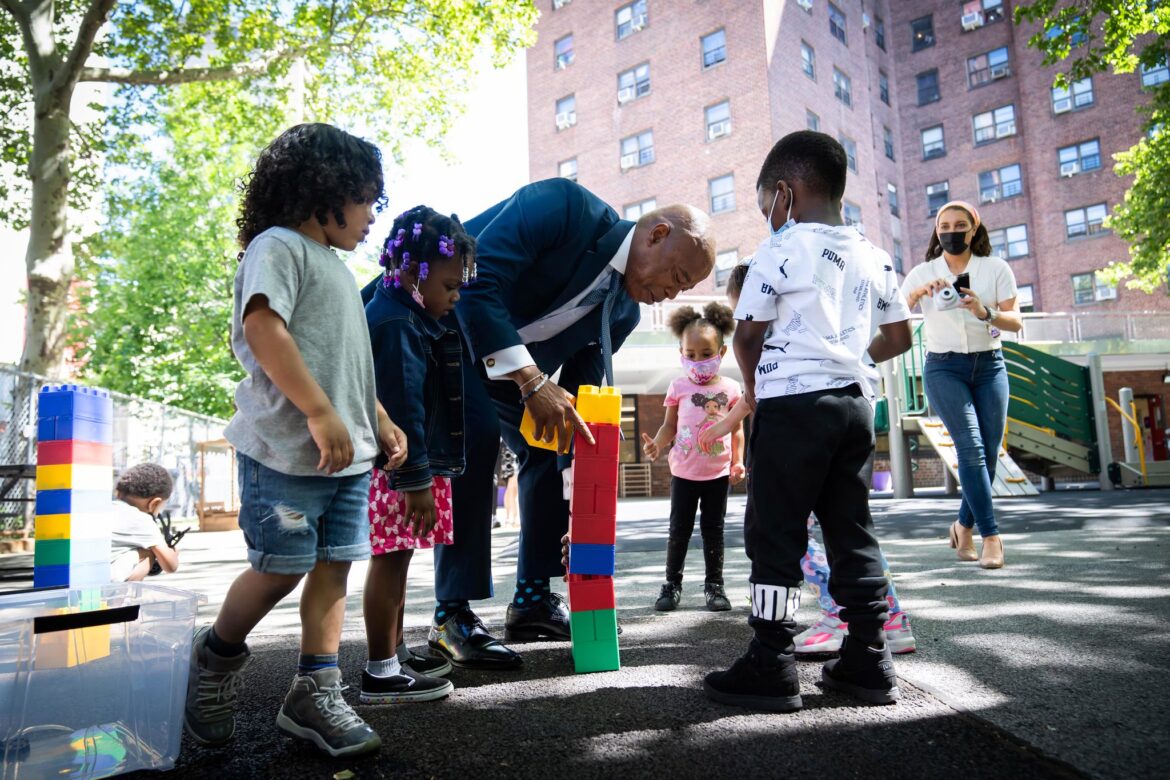“We already experienced a retrenchment of the city’s commitment to Universal Pre-K and Universal 3K programs. Parents can’t afford to lose more ground.”

Ed Reed/Mayoral Photography Office
Mayor Eric Adams at an early childhood education center in Manhattan in 2022, when he rolled out child care plan.The recent federal indictment of New York City Mayor Eric Adams has sent shockwaves through the political landscape. As the city grapples with this unprecedented situation, it is essential to consider the ripple effects such a scandal may have beyond the immediate political arena—particularly on the nonprofit child care sector, which plays a crucial role in supporting families throughout the city.
Community-based providers depend on contracted public funding to maintain services like subsidies for low-income families, staff salaries, and facility operations. Should this funding be revoked or reallocated amidst political upheaval, families already struggling to make ends meet could see a rise in child care costs. Providers may be forced to reduce their services, lay off staff (the majority of whom are women of color) or close their doors entirely, a reality facing many child care providers already.
The uncertainty caused by the indictment and ensuing resignations may also shift the focus of city officials and agencies away from addressing the affordable child care crisis. Reforming and expanding child care support to address systemic barriers, many laid out in the mayor’s own 10 point plan to make high-quality child care more affordable and accessible, could be delayed even further as attention is drawn to the legal battle. We already experienced a retrenchment of the city’s commitment to Universal Pre-K and Universal 3K programs. Parents can’t afford to lose more ground.
The nonprofit child care sector is a cornerstone of community support that enables parents, especially mothers, to work, study, and contribute to the economy. It enlists thousands of employees in working class communities where our neighbors cannot afford to lose jobs.
In addition, research suggests that children who do not have access to quality early childhood education face significant, life-long disadvantages, with Black and Hispanic families affected disproportionately by the lack of quality child care options.. A 2024 New York City Child Care Coalition report showed that Black families in the Bronx were 40 percent more likely to live in child care deserts compared to white families in other boroughs.
In moments of adversity, there is also opportunity. Nonprofit child care providers can seize this moment to create innovative solutions for systemic change. This is an opportunity for collaboration between providers and government officials to develop sustainable solutions and strategies that address the looming challenges created by legal chaos, reduced funding, and the broader economic hurdles facing families in the city.
Implications of Mayor Adams’ indictment continue to unfold and the potential impact on nonprofit child care providers and families cannot be overlooked. The sector stands at a critical juncture; facing existential threats to serving New York families effectively. Navigating this will require a concerted effort from nonprofit leaders, government officials, and the community to ensure that vital services continue and that child care remains a legislative priority.
The resilience of the nonprofit sector, paired with advocacy and community engagement, can ensure we navigate these new challenges and continue to provide New York City’s most essential lifelines for families with children.
Robert Cordero is CEO of Grand Street Settlement, a major nonprofit provider of community-based child care in New York City.








